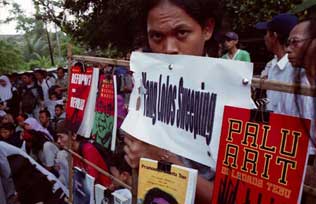
UNCENSORED THOUGHT: Activists rally in front of National Police Headquarters on May 15, 2001, to protest the banning of leftist books. JP/ R. Berto Wedhatama
|
|
|
March 15, 2007 |
 UNCENSORED THOUGHT: Activists rally in front of National Police Headquarters on May 15, 2001, to protest the banning of leftist books. JP/ R. Berto Wedhatama |
||
|
Book ban stirs murky
memories
City News - Thursday, March 15, 2007 Anissa S. Febrina, The Jakarta Post, Jakarta "What do you know about the G30S (September 30th movement)?" The Jakarta Post asked an 11th grader at state elementary school No. 3 in Setiabudi, South Jakarta, on Tuesday. "Oh, you mean the PKI (Indonesian Communist Party)?" asked Baby Zahwa, who had just finished her history exam. "Hmm, the G30S," the Post replied. "Yes, the PKI," Baby insisted, launching into an explanation most probably rote learned from her history textbook. History textbooks have always referred to the movement as the G30S/PKI. No questions asked. Or at least that was the logic the Attorney General's Office applied when it decided to ban dozens of history books written by prominent historians that no longer insist that the GS03 was a rebellious movement that sought to replace Sukarno's government with a Communist one. Following months of investigation, Junior Attorney General for Intelligence Affairs Muchtar Arifin told reporters last week that his office had banned, as of March 5, the textbooks, which have been used in schools and universities since 2004. The books not only failed to state the facts but challenged some "accepted truths", which could create public disorder, the Supreme Court announced. "Among the violations are the failure to state that the PKI was behind the attempted coup d'etat in Madiun in 1948, and no longer referring to the G30S/PKI, only the G30S," Muchtar said as quoted by Kompas daily. The AGO has the authority to monitor the circulation of written material and banned a number of books "deemed capable of disrupting political stability" during the Soeharto era. Its latest decision to ban 13 books released by a number of publishing houses, and any other textbooks that express the same views, is based on a 1963 decree and a 1969 law on published materials that could cause public disorder. Diah Harianti, the head of the National Education Ministry's curriculum center, said the 2004 curriculum more comprehensively explained the events surrounding Sept. 30, 1965. Previously, students had only a single image of the PKI: a group of communists able to torture heroic Army generals and hundreds more people for the sake of taking over. The 2004 curriculum highlighted the social conflicts and ideological and political differences that existed among citizens in 1965. In the 2004 high school curriculum published by the center, as approved by then-director general for basic and secondary education Indra Jati Sidi, among the indicators for students' competence in the subject is the ability to compare different versions of the G30S event. Later, during the AGO's probe into the issue, Education Minister Bambang Sudibyo said the book was only a draft and had not been approved. "We consulted many historians and experts on the issue before deciding to insert it into the curriculum," said a source who was involved in the drafting process. The source said the process of progressively reforming the curriculum had been inspired by the change of political regimes during the presidency of Abdurrahman Wahid. "Back then, a group of historians including Taufik Abdullah and Anhar Gonggong, submitted a supplement to the white book of Indonesian history, including on issues pertaining to the G30S," the source said. The white book was the official version of events issued by the State Secretary prior to 2004. "They even supplied schools with it as an additional reference." The blue book of the 2004 curriculum was later on used by writers and publishers as a reference. But it seems that nothing has changed much. Despite the fact that those stigmatized by the label PKI have filed a class action against the state for the years they spent on Buru Island, the country has never been able to overcome its paranoia about communism. One can easily download The Communist Manifesto from the internet, but dozens of others will not stop reminding us of how unacceptable communism, socialism or Marxism is in a country ruled by the market. It is not difficult to find banners that read "Marxism/Communism is banned in Indonesia" or "Beware of New Communism" hanging in public places. On the other hand, it became part of the trend to reread -- or read for the first time -- various versions of Marx's Das Kapital easily found in bookstores. Despite the fact that participants in a discussion on Marxism in Bandung last December were taken down to the local police station. The Post has its own direct experience of "communism paranoia". On Aug. 11, 2006, a package containing The Rise of Indonesian Communism written by Ruth T. McVey and addressed to the Post was held by the Customs and Excise Office based on its title alone. An attempt to obtain the letter required from the AGO for the release of the book was unsuccessful. One need not know about historiography to be able to say that history is indeed "his story". To put it in George Orwell's words: "who controls the present controls the past, who controls the past controls the future". Who controls our history? |